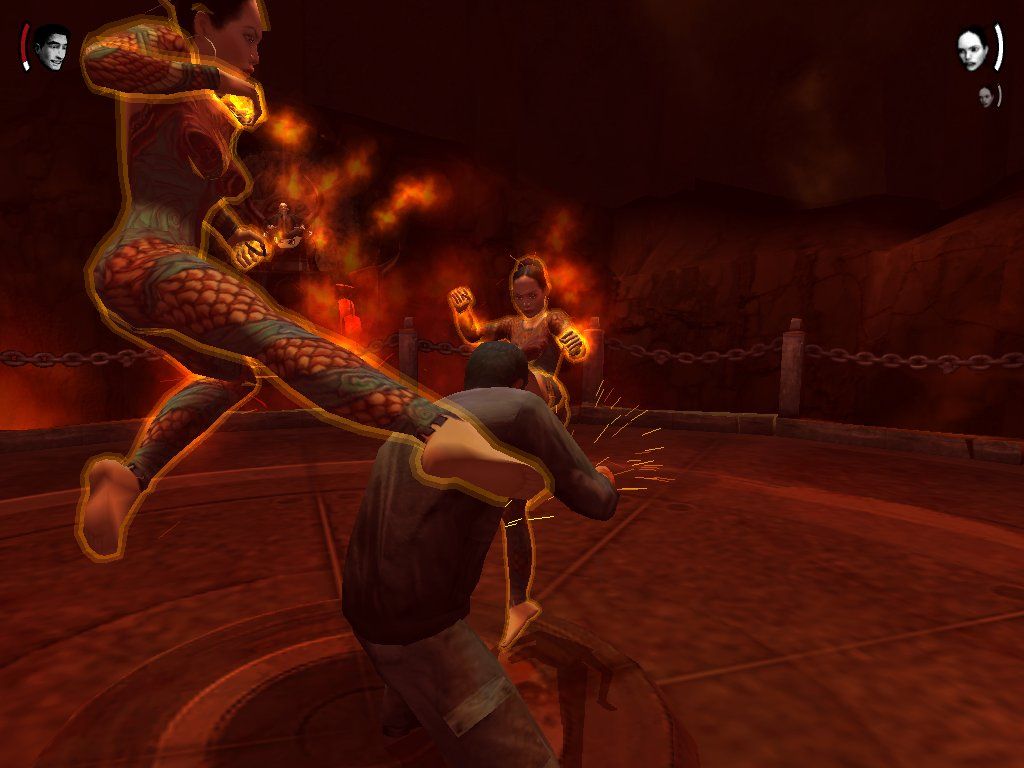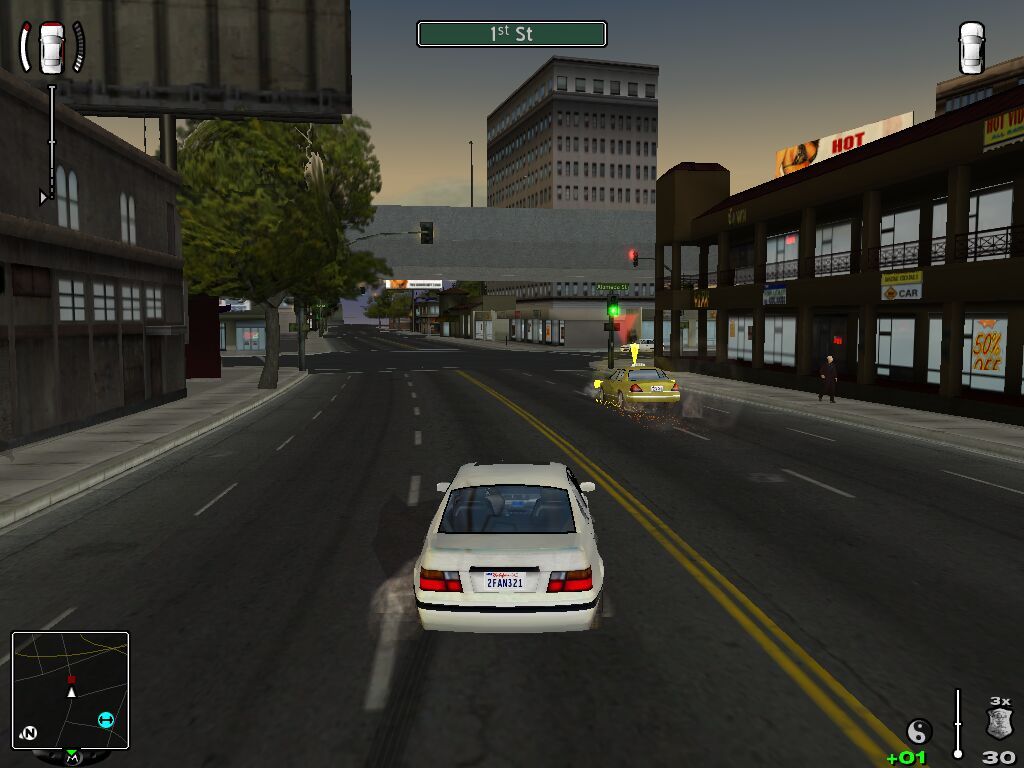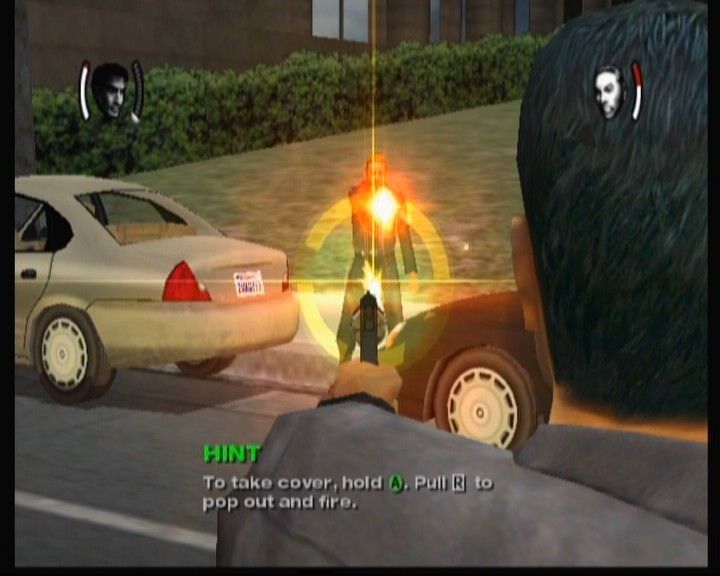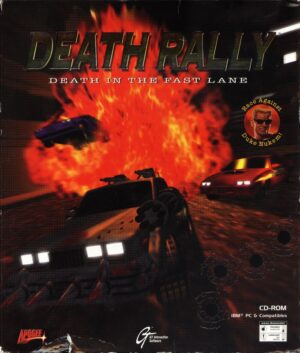Retro Replay Review
Gameplay
True Crime: Streets of LA delivers a hybrid experience that blends open-world exploration with mission-based structure, giving players a sense of freedom rarely seen in early 2000s titles. From the moment you take control of Nick Kang, you can hijack any car in the sprawling 240 square miles of Los Angeles and dive straight into the action. The seamless transition between driving and on-foot movement allows for dynamic responses: whether you’re engaging in high-speed chases, sprinting through alleys, or ducking behind cars to take out enemies, the game rarely pauses for breath.
(HEY YOU!! We hope you enjoy! We try not to run ads. So basically, this is a very expensive hobby running this site. Please consider joining us for updates, forums, and more. Network w/ us to make some cash or friends while retro gaming, and you can win some free retro games for posting. Okay, carry on 👍)
The mission design alternates between third-person shooting, hand-to-hand combat, and stealth sequences, ensuring variety throughout the campaign. Shooting segments are tense affairs—enemies ambush you in waves, and Nick’s “bullet time” move becomes indispensable when bullets fly fast. Meanwhile, the martial arts system is surprisingly deep: you can string together punches, kicks, grapples, and improvised weapon strikes into satisfying combos that feel weighty and impactful.
Outside of story missions, street crime calls provide plenty of side content. Nick receives real-time dispatch alerts, letting you chase down robbers, defuse gang fights, or rescue hostages. Your approach—arresting with diplomacy or neutralizing threats with lethal force—earns “good cop” or “bad cop” points, which later shape narrative branches. This morality meter adds replayability, encouraging experimentation with stealth takedowns versus full-frontal assaults.
Graphics
For its time, True Crime: Streets of LA pushes the limits of the PlayStation 2 and original Xbox hardware. The Los Angeles skyline and iconic landmarks—Hollywood Boulevard, Chavez Ravine, and the bustling Chinatown district—are faithfully rendered with a surprising amount of detail. Texture pop-in and occasional frame drops can occur during crowded gunfights or when traversing the city at high speed, but these minor hiccups seldom break immersion.
Character models exhibit a range of facial animations during cutscenes, conveying tension and grit in Nick’s interactions with allies and suspects alike. Environments feature destructible elements—breakable windows, shatterable doors, and easily damaged vehicles—amplifying the chaos of firefights. Lighting and shadow effects further enhance the mood, especially in nighttime Blackjack hideouts or neon-lit Chinatown backstreets.
While the visual fidelity may feel dated compared to modern standards, there’s nostalgic charm in the weather effects and particle systems that still hold up. Explosions bloom with satisfying force, and muzzle flashes illuminate smoke-filled alleys with cinematic flair. True Crime’s ambition in worldbuilding shines through, making Los Angeles feel alive and reactive to your every move.
Story
At the heart of True Crime: Streets of LA is Nick Kang—a brash, young Chinese-American detective with a penchant for bending the rules. Suspended by the LAPD for his extreme tactics, Nick stands at a crossroads between upholding the law and embracing the vigilante life he’s drawn to ever since his father’s murder. When Wanda Parks, head of the Elite Operations Division, recruits him to investigate a string of violent attacks in Chinatown, she grants him full autonomy: “You do it your way.”
The narrative unfolds through a series of cinematic cutscenes that punctuate each chapter, weaving in personal stakes alongside high-profile criminal conspiracies. As Nick delves deeper into the Chinatown underworld, he uncovers connections to a shadowy network of syndicates and potentially corrupt insiders. The tension between Nick’s desire for revenge and his duty to protect civilians drives every choice you make, making the stakes feel personal.
Choice plays a pivotal role in shaping the story’s trajectory. Rack up good cop points by performing nonlethal takedowns and honoring civilian lives, or embrace your darker side with ruthless force. These decisions unlock branching paths and multiple endings, ensuring that Nick’s journey remains fresh on subsequent playthroughs. The balance between narrative cohesion and player agency is managed deftly, keeping you invested in the outcome.
Overall Experience
True Crime: Streets of LA stands as a testament to the ambition of early open-world action games. Its sprawling representation of Los Angeles offers nearly limitless avenues for gameplay, from high-octane car chases to tense undercover operations. The varied mission types and fast-paced combat keep adrenaline levels high, while side missions and random crimes pepper the streets with emergent encounters.
The moral choice system adds depth beyond typical shoot-’em-up fare, urging players to consider the consequences of lethal force versus lawful arrests. This dynamic not only affects the narrative but also influences how NPCs react to Nick—altering dialogue, mission availability, and the final chapters of the story. The result is a layered experience that rewards multiple playthroughs.
Despite some technical limitations—occasional frame rate dips and the aging graphics engine—True Crime: Streets of LA remains a captivating journey for fans of open-world action. Its blend of cinematic storytelling, robust combat mechanics, and the freedom to tackle missions your way creates a memorable ride through the City of Angels. For those seeking a gritty, choice-driven police thriller with plenty of explosive moments, Nick Kang’s adventure is one worth revisiting.
 Retro Replay Retro Replay gaming reviews, news, emulation, geek stuff and more!
Retro Replay Retro Replay gaming reviews, news, emulation, geek stuff and more!









Reviews
There are no reviews yet.